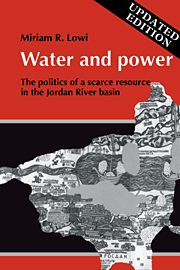Book contents
- Frontmatter
- Contents
- List of illustrations
- List of tables
- Preface
- Preface to the paperback edition
- List of abbreviations
- 1 Introduction: conflict and cooperation in international river basins
- Part I Riparian dilemmas
- Part II The Jordan waters conflict
- Part III The Jordan basin since 1967
- Appendix 1 US involvement in water development in the Jordan basin
- Appendix 2 The unified development of the water resources of the Jordan Valley region
- Appendix 3 The Arabs' plan for development of water resources in the Jordan Valley
- Appendix 4 The Cotton plan for the development and utilization of the water resources of the Jordan and Litani River basins
- Appendix 5 Annex II: from, Treaty of Peace Between the State of Israel and the Hashemite Kingdom of Jordan
- Notes
- Select bibliography
- Index
- Cambridge Middle East Library
1 - Introduction: conflict and cooperation in international river basins
Published online by Cambridge University Press: 08 December 2009
- Frontmatter
- Contents
- List of illustrations
- List of tables
- Preface
- Preface to the paperback edition
- List of abbreviations
- 1 Introduction: conflict and cooperation in international river basins
- Part I Riparian dilemmas
- Part II The Jordan waters conflict
- Part III The Jordan basin since 1967
- Appendix 1 US involvement in water development in the Jordan basin
- Appendix 2 The unified development of the water resources of the Jordan Valley region
- Appendix 3 The Arabs' plan for development of water resources in the Jordan Valley
- Appendix 4 The Cotton plan for the development and utilization of the water resources of the Jordan and Litani River basins
- Appendix 5 Annex II: from, Treaty of Peace Between the State of Israel and the Hashemite Kingdom of Jordan
- Notes
- Select bibliography
- Index
- Cambridge Middle East Library
Summary
Well before the emergence of the nation-state, the arbitrary political division of a unitary river basin — the area of land drained by a river and its tributaries — led to problems regarding the interests of the states and/or communities located within the basin and the manner in which conflicting interests should be resolved. Geography suggests that, by virtue of its physical unity, a river basin should be developed as a single, indivisible whole, irrespective of political divisions. This is so, because moving water, flowing toward an outlet (or outlets), binds land areas together, and interference with the water and its movement at any point has repercussions elsewhere in the basin. Indeed, the river basin can be considered a common property resource by virtue of the fact that its exploitation by one beneficiary may diminish the benefits enjoyed by all others. From the point of view of economic efficiency, as well, the basin should be treated as a unit; in that way, “a careful inventory of soils, feasibility of irrigation and drainage, values of alternative crops, domestic and industrial water needs, could be factored into a basin-wide model that might…yield an ‘optimal’ pattern of water utilization.” To wit, the situation in international river basins exemplifies the pervasive collective action problem: the pursuit of interests defined in purely individualistic terms would lead to socially undesirable outcomes.
- Type
- Chapter
- Information
- Water and PowerThe Politics of a Scarce Resource in the Jordan River Basin, pp. 1 - 16Publisher: Cambridge University PressPrint publication year: 1993



